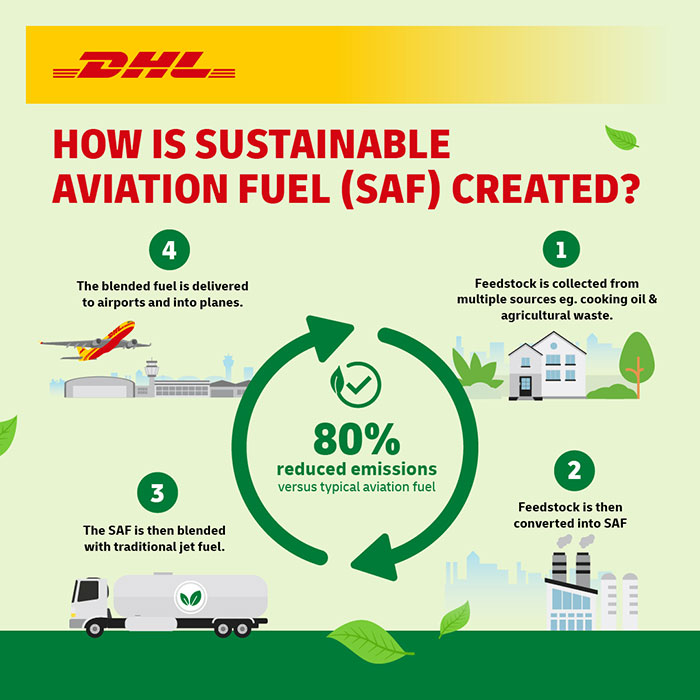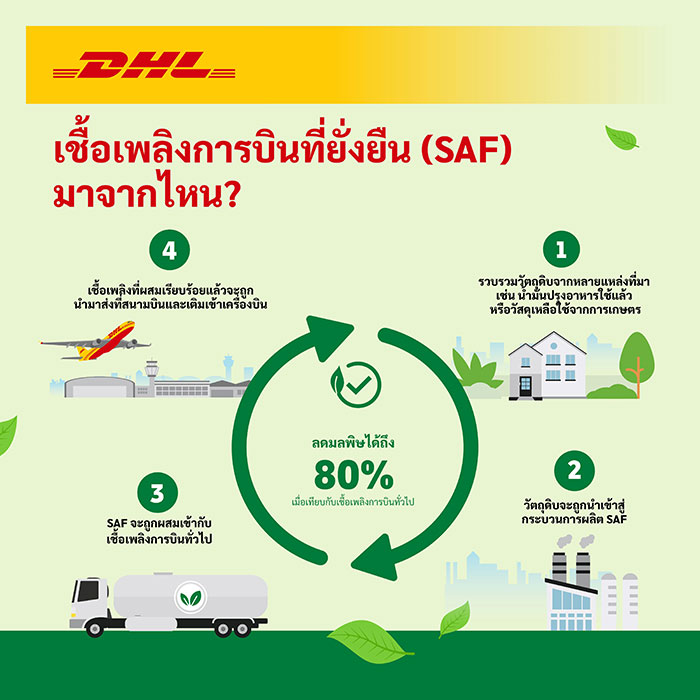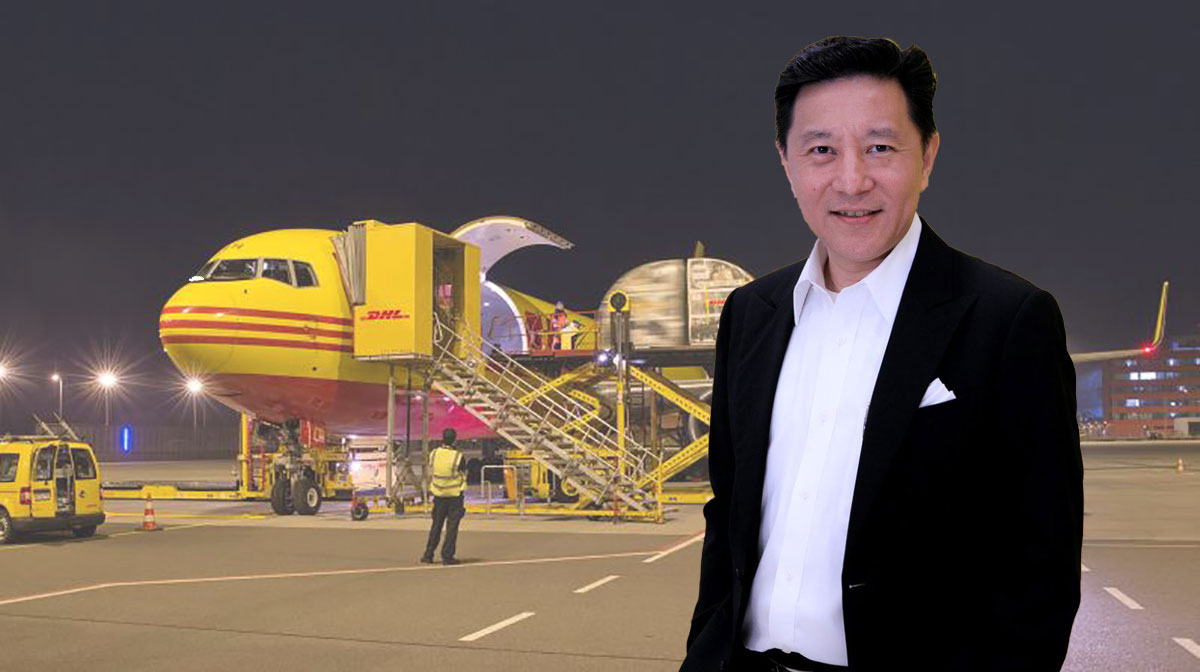Contributed by DHL Express Thailand
Sustainable Aviation Fuel (SAF) is considered the optimal solution currently available for mitigating greenhouse gas (GHG) emissions in the aviation sector. Biofuels are made from sustainable and renewable resources (feedstock) such as used cooking oil, animal fats, and agricultural waste. SAF is one of the more promising energy resources for airline decarbonization due to their feasibility and environmental impact. They can reduce emissions by up to 80% compared to traditional jet fuel, making them a key tool in the fight against climate change. The International Air Transport Association (IATA) estimates that SAF could contribute around 65% of the reduction in GHG emissions needed by aviation to reach net zero in 2050.

SAF offers several benefits over traditional jet fuel, including significantly reducing GHG emissions, lower particulate matter emissions, and improved air quality. SAF must be blended with traditional fossil fuel based jet fuels. This allows for the use of SAF as a ‘drop-in’ fuel, blending with kerosene in aircraft without any modifications. Current blending rates are capped at 50%. SAF releases the carbon that was absorbed by the feedstock during its lifecycle, meaning they are almost carbon-neutral.
Today, the aviation industry is a major producer of GHG emissions. More needs to be done to significantly lower GHG emissions by 2050. The push for SAF is to immediately address this crucial gap and propel the aviation industry toward a more sustainable future. However, the “limited SAF supply” poses a substantial impediment to its widespread adoption. Here’s how businesses can purchase and harness SAF effectively.
How can businesses access sustainable aviation fuels?
Similar to how consumers cannot control the source of renewable energy that is piped into their homes, people who purchase airline seats or air cargo services have no control over the fuel pumped into the aircraft. That is where the SAFc (SAF Certificate) comes in. SAFc are modeled after energy attribute certificates (EACs), which helped to enable the power of markets to drive change and accelerate demand for renewable energy. Corporations and individuals can purchase sustainable aviation fuel certificates to achieve their climate goals.
This is all done through a ‘Book and Claim’ accounting system that tracks and transfers the emission reductions from sustainable fuels across the value chain. The buyer ‘books’ a specific quantity of sustainable fuel at the time of purchase and then ‘claims’ the emissions reduction toward their sustainability targets. The buyer will receive that independently verified certificate when they purchase sustainable fuels through the book and claim system. Thus, even though their package might not have been shipped in a plane powered by sustainable fuel, somewhere in the world, “someone else’s” shipment did. Their purchase has replaced fossil-based fuel and reduced overall transport emissions – and they will get the credit for that.
As a result, the buyer owns the environmental benefits without physically possessing the fuel. By buying and selling SAFc, companies enjoy the environmental benefits of SAF even though the physical fuel might not end up in the aircraft that carries their goods. The system gives everyone in the industry access to the market regardless of location or size. SAFc delivered through ‘Book and Claim’ also helps minimize both logistical costs and emissions as the fuel does not need to be shipped worldwide. This helps make SAFc the most efficient way to decarbonize aviation.
Collaborating with committed partners to drive demand for sustainable aviation fuel
How can businesses create the demand needed to boost supply? Collaborating with committed partners and offering customers more sustainable solutions is one way, and each partnership is an all-important milestone on the sustainability journey.
The ‘Book and Claim’ approach enhances transparency and accountability of sustainable fuels by ensuring that the emission reductions associated with each credit are accurately transferred and verified by a third party. As a result, companies can purchase SAFc, utilize the associated emission reductions, and extend the environmental attributes to customers through the service, for example, DHL GoGreen Plus. It also gives companies the option to reduce the carbon emissions associated with their shipments by using SAF and actively reducing Scope 3 emissions through the steps below:
- The company decides how much they would like to reduce their GHG emissions and how much to invest in SAF
- DHL Express will use the contribution to invest in SAF and an independent auditor will annually verify the emission reduction value of the purchased SAF, as well as verify that all their investment has been exclusively used for SAF
- The company will receive a certificate with the GHG emission reduction value, which can be used to reduce their Scope 3 footprint
- Customers will receive a complimentary carbon footprint report
In early 2022, DHL announced two of the largest SAF deals: a collaboration with bp and Neste to buy more than 800 million liters through 2026. In 2023, DHL Express and World Energy also signed a seven-year agreement, to run through 2030, to speed up aviation decarbonization through the purchase of approximately 668 million liters of SAF via SAFc. DHL is also working with Neste and ISCC to develop a new system, which enables airlines, logistics providers, and end customers to credibly report their emissions reductions whenever they purchase SAF.
Herbert Vongpusanachai, Managing Director, Thailand & Head of Indochina, DHL Express, said, “DHL Express is committed to becoming a leader in sustainable aviation. We are now the sole express service provider offering SAF for cross-border express delivery services. We can help customers minimize the GHG emissions footprint of transported goods and contribute to a more sustainable future by partnering with leading SAF producers and low-carbon solutions providers. We plan to increase our use of SAF to more than 30% by 2030. By 2050, we aim to reduce all logistics-related emissions to net zero and we are making substantial progress towards this target. If others do the same, sustainable aviation fuel supply should increase rapidly. We therefore aim to inspire our customers to accelerate industry-wide production and adoption of SAF.”
บทความโดย ดีเอชแอล เอ๊กซ์เพรส ประเทศไทย
เชื้อเพลิงการบินที่ยั่งยืน (Sustainable Aviation Fuel – SAF) ถือเป็นทางออกที่เหมาะสมที่สุดในการลดการปล่อยก๊าซเรือนกระจกในภาคธุรกิจการบิน โดยเชื้อเพลิง SAF ผลิตจากทรัพยากร (feedstock) ที่หมุนเวียนและยั่งยืน เช่น น้ำมันปรุงอาหารที่ใช้แล้ว ไขมันสัตว์ และของเหลือทิ้งจากผลผลิตทางการเกษตร ซึ่งเชื้อเพลิง SAF เป็นหนึ่งในแหล่งพลังงานที่มีความเหมาะสมอย่างมากในการลดปริมาณก๊าซคาร์บอนในอุตสาหกรรมการบินจากความเป็นไปได้ในทางปฏิบัติและการสร้างอิมแพคต่อสิ่งแวดล้อม โดยจะช่วยลดการปล่อยก๊าซเรือนกระจกได้มากถึง 80% เมื่อเทียบกับเชื้อเพลิงเครื่องบินแบบเก่า ดังนั้นจึงนับเป็นเครื่องมือสำคัญในการรับมือกับการเปลี่ยนแปลงของสภาพภูมิอากาศ สมาคมขนส่งทางอากาศระหว่างประเทศ (International Air Transport Association – IATA) ประมาณการว่า SAF จะช่วยลดการปล่อยก๊าซเรือนกระจกในอุตสาหกรรมการบินได้ถึง 65% ตามเป้าหมายการลดคาร์บอนสุทธิให้เหลือศูนย์ (Net Zero) ภายในปี 2593

เชื้อเพลิง SAF มีข้อดีหลายประการที่เหนือกว่าเชื้อเพลิงเครื่องบินแบบเก่า ซึ่งรวมถึงการลดการปล่อยก๊าซเรือนกระจกอย่างมีนัยสำคัญ ลดการปล่อยฝุ่นละออง และปรับปรุงคุณภาพอากาศให้ดีขึ้น ในการใช้งาน ต้องนำ SAF ไปผสมกับน้ำมันเชื้อเพลิงเครื่องบินที่มาจากเชื้อเพลิงฟอสซิลแบบดั้งเดิม ทำให้ SAF เป็นเชื้อเพลิงแบบดรอปอิน (drop-in fuel) ที่ผสมกับน้ำมันเครื่องบินทั่วไปโดยไม่ต้องปรับแต่งใดๆ ปัจจุบันอัตราส่วนการผสมสูงสุดของเชื้อเพลิง SAF อยู่ที่ 50% โดยปล่อยคาร์บอนที่ถูกดูดซับด้วย feedstock ทําให้ SAF เป็นกลางทางคาร์บอนเกือบสมบูรณ์
ปัจจุบัน อุตสาหกรรมการบินเป็นแหล่งผลิตก๊าซเรือนกระจกรายใหญ่ และจำเป็นที่จะต้องเร่งดำเนินมาตรการเพื่อลดการปล่อยก๊าซเรือนกระจกภายในปี 2593 การผลักดันการใช้เชื้อเพลิง SAF มีจุดมุ่งหมายเพื่อแก้ไขปัญหานี้โดยทันที และขับเคลื่อนอุตสาหกรรมการบินไปสู่อนาคตที่ยั่งยืน อย่างไรก็ตาม ‘การผลิต SAF ที่จำกัด’ คืออุปสรรคสําคัญต่อการนําไปใช้อย่างแพร่หลาย ต่อไปนี้คือแนวทางที่องค์กรธุรกิจต่างๆ จะสามารถซื้อ SAF และใช้ประโยชน์จากเชื้อเพลิงนี้ได้อย่างมีประสิทธิภาพ
ธุรกิจต่างๆ จะเข้าถึง SAF ได้อย่างไร
เช่นเดียวกับที่ผู้บริโภคไม่สามารถควบคุมแหล่งพลังงานหมุนเวียนที่ส่งเข้าบ้านของตนได้ ผู้ซื้อตั๋วเครื่องบินหรือบริการขนส่งทางอากาศก็ไม่สามารถควบคุมเชื้อเพลิงที่ใช้ในเครื่องบินได้เช่นกัน และนั่นคือที่มาของ ‘ใบรับรองการใช้เชื้อเพลิง SAFc (SAF Certificate)’ ซึ่งมีแบบอย่างมาจากใบรับรองคุณลักษณะด้านพลังงาน (Energy Attribute Certificate – EAC) ช่วยให้ตลาดมีอำนาจขับเคลื่อนการเปลี่ยนแปลง และกระตุ้นความต้องการพลังงานหมุนเวียน บริษัทและบุคคลทั่วไปสามารถซื้อใบรับรองการใช้เชื้อเพลิงการบินที่ยั่งยืนเพื่อให้บรรลุเป้าหมายการลดก๊าซเรือนกระจกของตนเองได้
ทั้งหมดนี้ดำเนินการผ่านระบบบัญชี ‘Book and Claim’ ที่ตรวจสอบติดตามและถ่ายโอนการลดการปล่อยก๊าซเรือนกระจกด้วยเชื้อเพลิงที่ยั่งยืน ครอบคลุมทุกส่วนของ value chain โดยผู้ซื้อสามารถทำการ ‘จอง’ ปริมาณเชื้อเพลิงที่ยั่งยืน ณ เวลาที่ซื้อ จากนั้นก็ ‘อ้างสิทธิ์’ ในการลดการปล่อยก๊าซเรือนกระจกตามเป้าหมายความยั่งยืนของตน ผู้ซื้อจะได้รับ ‘ใบรับรอง’ ที่ผ่านการตรวจสอบจากหน่วยงานอิสระเมื่อซื้อเชื้อเพลิงที่ยั่งยืนผ่านระบบ Book and Claim ดังนั้นถึงแม้ว่าพัสดุหรือสินค้าของพวกเขาอาจไม่ได้จัดส่งในเครื่องบินขนส่งสินค้าที่ขับเคลื่อนด้วยเชื้อเพลิงที่ยั่งยืน แต่ “ผู้อื่น” สามารถใช้เชื้อเพลิงที่ยั่งยืนแทนได้ในทุกที่ของโลก ดังนั้นการซื้อในลักษณะเช่นนี้จึงเป็นการทดแทนการใช้เชื้อเพลิงจากฟอสซิล และลดการปล่อยก๊าซจากการขนส่งโดยรวม และผู้ซื้อจะได้รับเครดิตจากการดำเนินการดังกล่าวด้วย
ด้วยเหตุนี้ ผู้ซื้อจึงเป็นเจ้าของผลประโยชน์ด้านสิ่งแวดล้อมจากการใช้เชื้อเพลิงการบินที่ยั่งยืนโดยไม่จำเป็นต้องครอบครองเชื้อเพลิงโดยตรง ด้วยการซื้อและขายใบรับรอง SAFc บริษัทต่างๆ จะสามารถเป็นเจ้าของผลประโยชน์ด้านสิ่งแวดล้อมผ่านการใช้ SAF แม้ว่าเชื้อเพลิง SAF จริงๆ อาจไม่ได้ถูกใช้ในเครื่องบินที่บรรทุกสินค้าของบริษัทนั้นๆ ก็ตาม ระบบนี้เปิดโอกาสให้ทุกคนในอุตสาหกรรมสามารถเข้าถึงตลาดเชื้อเพลิงการบินที่ยั่งยืนได้ ไม่ว่าบริษัทจะตั้งอยู่ที่ไหนในโลกหรือขนาดขององค์กรจะเล็กหรือใหญ่ ใบรับรอง SAFc ที่จัดส่งผ่านระบบ ‘Book and Claim’ ยังช่วยลดทั้งต้นทุนในการขนส่งและลดการปล่อยก๊าซเรือนกระจก เนื่องจากไม่ต้องขนส่งเชื้อเพลิงจริงไปทั่วโลก ทำให้ SAFc เป็นวิธีที่มีประสิทธิภาพมากที่สุดในการช่วยลดคาร์บอนในอุตสาหกรรมการบินในเวลานี้
ร่วมมือกับพันธมิตรที่มีความมุ่งมั่นในการขับเคลื่อนความต้องการ SAF
ธุรกิจต่างๆ จะสร้างอุปสงค์หรือดีมานด์ที่จำเป็นในการเพิ่มอุปทานหรือซัพพลายได้อย่างไร คำตอบก็คือการผนึกกำลังร่วมกับบริษัทและองค์กรที่มีแนวคิดคล้ายกัน ร่วมมือกับพันธมิตรที่มีความมุ่งมั่นและนำเสนอโซลูชั่นที่ยั่งยืนมากขึ้นให้แก่ลูกค้า โดยแต่ละความร่วมมือถือเป็นก้าวสำคัญในการเดินทางสู่ความยั่งยืน
แนวทาง ‘Book and Claim’ ช่วยเพิ่มความโปร่งใสและความรับผิดชอบในการใช้เชื้อเพลิงที่ยั่งยืน โดยทำให้มั่นใจได้ว่าการลดการปล่อยก๊าซเรือนกระจกที่เกี่ยวข้องกับแต่ละเครดิตได้ถูกโอนและตรวจสอบโดยบุคคลที่สามอย่างถูกต้อง
ดังนั้น บริษัทต่างๆ สามารถซื้อ SAFc และใช้ประโยชน์จากการลดการปล่อยก๊าซเรือนกระจก พร้อมทั้งขยายคุณลักษณะด้านสิ่งแวดล้อม (Environmental Attributes) ไปสู่ลูกค้าผ่านการให้บริการ เช่น DHL GoGreen Plus นอกจากนี้ยังให้ทางเลือกแก่บริษัทต่างๆ ในการลดการปล่อยก๊าซคาร์บอนที่เกี่ยวข้องกับการขนส่งด้วยการใช้ SAF และลดการปล่อยก๊าซเรือนกระจกตาม Scope 3 ด้วยการดำเนินการตามขั้นตอนต่อไปนี้:
- บริษัทตัดสินใจว่าต้องการลดการปล่อยก๊าซเรือนกระจกปริมาณเท่าไร และจะลงทุนใน SAF เป็นจำนวนเท่าไร
- ดีเอชแอล เอ๊กซ์เพรส จะนำปริมาณดังกล่าวไปร่วมลงทุนใน SAF และผู้ตรวจสอบอิสระจะตรวจสอบมูลค่าการลดการปล่อยก๊าซเรือนกระจกของ SAF ในแต่ละปี รวมถึงการยืนยันว่าการลงทุนทั้งหมดได้ถูกใช้สำหรับ SAF เท่านั้น
- บริษัทจะได้รับใบรับรองการลดการปล่อยก๊าซเรือนกระจกที่สามารถนำไปใช้ในการลดคาร์บอนฟุตพริ้นท์ตาม Scope 3 ได้
- บริษัทจะได้รับรายงานการปล่อยก๊าซคาร์บอนโดยไม่มีค่าใช้จ่าย
เมื่อต้นปี 2565 ดีเอชแอลได้ประกาศสองข้อตกลงด้านความร่วมมือเกี่ยวกับ SAF ที่ใหญ่ที่สุด นั่นคือ การร่วมมือกับ bp และ Neste ในการซื้อเชื้อเพลิง SAF มากกว่า 800 ล้านลิตรจนถึงปี 2569 และในปี 2566 ดีเอชแอล เอ๊กซ์เพรส และ World Energy ยังได้ลงนามในข้อตกลงระยะเวลา 7 ปี ซึ่งจะมีผลจนถึงปี 2573 เพื่อเร่งการลดคาร์บอนด้วยการซื้อ SAF ประมาณ 668 ล้านลิตรผ่าน SAFc นอกจากนี้ ดีเอชแอลยังทำงานร่วมกับ Neste และ ISCC เพื่อพัฒนาระบบใหม่ ซึ่งช่วยให้สายการบิน ผู้ให้บริการโลจิสติกส์ และลูกค้าปลายทางสามารถรายงานการลดการปล่อยก๊าซเรือนกระจกได้เมื่อมีการซื้อ SAF
เฮอร์เบิร์ต วงศ์ภูษณชัย กรรมการผู้จัดการดีเอชแอล เอ๊กซ์เพรส ประเทศไทยและหัวหน้าประจำภูมิภาคอินโดจีน กล่าวว่า “ดีเอชแอล เอ๊กซ์เพรสมุ่งมั่นที่จะเป็นผู้นำในการสร้างอนาคตที่ยั่งยืนสำหรับธุรกิจขนส่งทางอากาศ ปัจจุบันเราเป็นผู้ให้บริการขนส่งด่วนระหว่างประเทศเพียงรายเดียวที่ใช้เชื้อเพลิง SAF ในการขนส่งสินค้าทางเครื่องบินเพื่อการส่งออกและนำเข้า เราสามารถช่วยลูกค้าลดการปล่อยก๊าซคาร์บอนไดออกไซด์และสนับสนุนอนาคตที่ยั่งยืนมากขึ้นด้วยการร่วมมือกับผู้ผลิต SAF ชั้นนำและผู้ให้บริการโซลูชั่นคาร์บอนต่ำ เราวางแผนจะเพิ่มการใช้ SAF มากกว่า 30% ภายในปี 2573 และภายในปี 2593 เราตั้งเป้าจะลดการปล่อยก๊าซเรือนกระจกที่เกี่ยวข้องกับการขนส่งทั้งหมดให้เหลือศูนย์ (Net Zero) โดยปัจจุบันการดำเนินการของเรามีความก้าวหน้าอย่างมาก หากองค์กรอื่นๆ ทำแบบเดียวกันนี้ อุปทานของเชื้อเพลิงการบินที่ยั่งยืนก็จะเพิ่มขึ้นอย่างรวดเร็ว เราจึงมุ่งหวังที่จะผลักดันการใช้เชื้อเพลิง SAF ให้แพร่หลายในอุตสาหกรรม”


